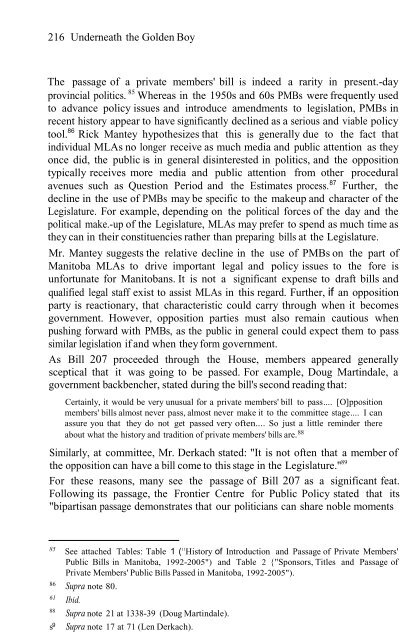UTGB Vol 5.pdf - Robson Hall Faculty of Law
UTGB Vol 5.pdf - Robson Hall Faculty of Law
UTGB Vol 5.pdf - Robson Hall Faculty of Law
You also want an ePaper? Increase the reach of your titles
YUMPU automatically turns print PDFs into web optimized ePapers that Google loves.
216 Underneath the Golden Boy<br />
The passage <strong>of</strong> a private members' bill is indeed a rarity in present.-day<br />
provincial politics. 85 Whereas in the 1950s and 60s PMBs were frequently used<br />
to advance policy issues and introduce amendments to legislation, PMBs in<br />
recent history appear to have significantly declined as a serious and viable policy<br />
tool. 86 Rick Mantey hypothesizes that this is generally due to the fact that<br />
individual MLAs no longer receive as much media and public attention as they<br />
once did, the public is in general disinterested in politics, and the opposition<br />
typically receives more media and public attention from other procedural<br />
avenues such as Question Period and the Estimates process. 87 Further, the<br />
decline in the use <strong>of</strong> PMBs may be specific to the makeup and character <strong>of</strong> the<br />
Legislature. For example, depending on the political forces <strong>of</strong> the day and the<br />
political make.-up <strong>of</strong> the Legislature, MLAs may prefer to spend as much time as<br />
they can in their constituencies rather than preparing bills at the Legislature.<br />
Mr. Mantey suggests the relative decline in the use <strong>of</strong> PMBs on the part <strong>of</strong><br />
Manitoba MLAs to drive important legal and policy issues to the fore is<br />
unfortunate for Manitobans. It is not a significant expense to draft bills and<br />
qualified legal staff exist to assist MLAs in this regard. Further, if an opposition<br />
party is reactionary, that characteristic could carry through when it becomes<br />
government. However, opposition parties must also remain cautious when<br />
pushing forward with PMBs, as the public in general could expect them to pass<br />
similar legislation if and when they form government.<br />
As Bill 207 proceeded through the House, members appeared generally<br />
sceptical that it was going to be passed. For example, Doug Martindale, a<br />
government backbencher, stated during the bill's second reading that:<br />
Certainly, it would be very unusual for a private members' bill to pass.... [O]pposition<br />
members' bills almost never pass, almost never make it to the committee stage.... I can<br />
assure you that they do not get passed very <strong>of</strong>ten.... So just a little reminder there<br />
about what the history and tradition <strong>of</strong> private members' bills are. 88<br />
Similarly, at committee, Mr. Derkach stated: "It is not <strong>of</strong>ten that a member <strong>of</strong><br />
the opposition can have a bill come to this stage in the Legislature." 89<br />
For these reasons, many see the passage <strong>of</strong> Bill 207 as a significant feat.<br />
Following its passage, the Frontier Centre for Public Policy stated that its<br />
"bipartisan passage demonstrates that our politicians can share noble moments<br />
85<br />
See attached Tables: Table 1 ( 11 History <strong>of</strong> Introduction and Passage <strong>of</strong> Private Members'<br />
Public Bills in Manitoba, 1992-2005") and Table 2 {"Sponsors, Titles and Passage <strong>of</strong><br />
Private Members' Public Bills Passed in Manitoba, 1992-2005").<br />
86<br />
Supra note 80.<br />
61<br />
Ibid.<br />
88<br />
Supra note 21 at 1338-39 (Doug Martindale).<br />
s 9<br />
Supra note 17 at 71 (Len Derkach).














